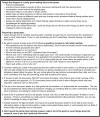Postsecondary biology students' ways of participating in the critique and discussion of primary scientific literature
- PMID: 37831683
- PMCID: PMC10756047
- DOI: 10.1187/cbe.22-11-0218
Postsecondary biology students' ways of participating in the critique and discussion of primary scientific literature
Abstract
Science advances through the interplay of idea construction and idea critique. Our goal was to describe varied forms of productive disciplinary engagement that emerged during primary literature discussions. Such descriptions are necessary for biology educators and researchers to design for and recognize diverse repertoires of participation in the critique and discussion of primary scientific literature. We identified three cases (a lower-division ecology course, an upper-division organismal course, and a journal club embedded in a summer research program) that were each designed with weekly primary literature discussions. We analyzed 12 discussions (four from each case) to describe what postsecondary students attend to when they critique and what forms of participation emerged from students reading and discussing primary scientific literature. Students participated in critique in all three cases and patterns in the substance and framing of critiques reflected the level of the context (lower- or upper-division). Students also shaped how they participated in ways that were relevant to the science classroom communities in each case. Our findings suggest that structuring primary literature discussions in ways that both elevate and connect students' agency and personal relevance is important for fostering varied forms of productive disciplinary engagement within a science classroom community.
Figures


References
-
- American Association for the Advancement of Science (2011). Vision and Change: A Call to Action, Final Report, Retrieved September 12, 2021, from www.visionandchange.org
-
- Bang, M., Brown, B., Calabrese Barton, A., Rosebery, A. S., Warren, B. (2017). Toward more equitable learning in science: Expanding relationships among students, teachers, and science practices. In Schwarz, C. V., Passmore, C., Reiser, B. J. (Eds.), Helping Students Make Sense of the World Using Next Generation Science and Engineering Practices (pp. 33–58). Arlington, VA: NSTA Press.
-
- Bolger, M. S., Osness, J. B., Gouvea, J. S., Cooper, A. C. (2021). Supporting scientific practice through model-based inquiry: A students’-eye view of grappling with data, uncertainty, and community in a laboratory experience. CBE—Life Sciences Education, 20(4). https://www.lifescied.org/doi/10.1187/cbe.21-05-0128 - DOI - PMC - PubMed
-
- Brooks, J. M., Grinath, J. B., Rasmussen, A. M., Grinath, A. S. (2023). “I know that’s a grasshopper, but I don’t know why”: An argument-driven inquiry activity for teaching Taxonomy. The American Biology Teacher, 85(3), 159–163.
-
- Brownell, S. E., Kloser, M. J., Fukami, T., Shavelson, R. (2012). Undergraduate Biology Lab Courses: Comparing the Impact of Traditionally Based" Cookbook" and Authentic Research-Based Courses on Student Lab Experiences. Journal of College Science Teaching, 41(4), 36–45.
MeSH terms
LinkOut - more resources
Full Text Sources

